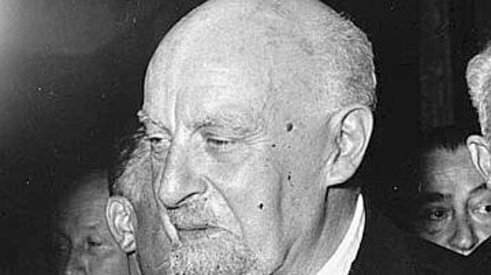Gioacchino Volpe, the forgotten historian who saw Italy's crisis before anyone else


Gioacchino Volpe - photo Wikipedia
the book
Patriot, fascist critic, censored monarchist: the story of an intellectual who lived through all the contradictions of twentieth-century Italy. A conference and a book tell his story.
Name of a grandfather who had been imprisoned as an anti-Bourbon patriot; Abruzzese, his mother was from Siena and he moved to Romagna; a great medievalist who later devoted himself increasingly to the general history of the Italian nation after having served as an officer in the Propaganda Office during the Great War, for which he also received a silver medal; a member of parliament for the “Listone” in the 1924 elections; Gioacchino Volpe was considered an ideologue of fascism , but on June 1, 1943, he had written a preface to a new edition of his “Italia moderna” in which he made implicit criticisms of the war and urged Italians to rally around the monarchy in such a way that he has been defined as a sort of historiographical “25th July,” two months early. Still a monarchist but in disagreement with the 8th September, he thus found himself simultaneously censored by the Italian Social Republic and purged in post-fascist Italy, with his ban from university teaching . A damnatio memoriae that also affected the 150th anniversary of his birth, in 2021. But almost as if to make amends for this , a conference on him was held in L'Aquila on 14 and 15 December 2023 under the auspices of the Abruzzese Institute for the History of the Resistance and Contemporary Italy (IASRIC) . The conference was dedicated in particular to his activity after the fall of fascism, and was divided into two sessions: the first chaired by Guido Melis; the second by Gianni Scipione Rossi. In view of the 50th anniversary of his death, on 16 February, the Proceedings have now been published by Rubbettino in the volume “Gioacchino Volpe nell'Italia repubblicana” , edited by Giovanni Belardelli and Gianni Scipione Rossi.
A journalist who directed RAI's parliamentary news program, the Training Center, and the Perugia School of Journalism, but also deputy vice president of the Ugo Spirito and Renzo De Felice Foundation, advisor to Iasric, and a distinguished historian, Gianni Scipione Rossi explains that the idea came from an article published on February 19, 2022, in Il Giornale, written by Francesco Perfetti, whom Gioacchino Volpe had the good fortune to know personally, while he was still in high school. He lamented that the centenary of the birth of such an important historian had been passed over in silence. Since Volpe was born in Abruzzo, and I was an advisor to the IASRIC, I then proposed holding this conference on his work after the war. What he had written before is well known, but very little is known about his work after the war and his expulsion from the University. There are many paradoxes about him. He had been a leading intellectual of the fascist regime, but he was also an absolute monarchist, which is why he had problems with both the RSI and the MSI after the war . And let's remember that in 1939, in his 'History of the Fascist Movement', he had made a very harsh criticism of the racial laws. In short, he was a very independent personality.
The volume also includes an essay on "Volpe in Postwar Right-Wing Journalism," Giuseppe Parlato's last work. It was published posthumously, 11 days after his death. "In reality, the book was printed before his death, so it's not posthumous. But, yes, it was put on sale afterwards. Parlato discovered that he had been a member of the National Monarchist Party. He had then been close to the MSI, and in 1950 he had even been present at the founding of FUAN, but there he had been criticized precisely for criticizing the single party and defending the monarchy. The following year, the Gruppo Universitario Romano Caravella published a collection of his writings, almost as compensation. In any case, Volpe was not a political militant."
But was this complicated connection with the postwar right a logical consequence of his ideas, or simply the result of resentment over the purge he had been subjected to? "He was first and foremost a scholar, but in my opinion his resentment was primarily for what he perceived as Italy's demise. For having lost the war, even though he had opposed the war alongside Hitler. His disappointment was due to the perception of a national disaster, which was obviously also linked to his frustration over being forced to abandon the university. But he continued to produce much, even without teaching at the university. His students always considered him a master."
Among them was Federico Chabod, a great historian of Italian foreign policy and the idea of Europe, leader of the Action Party, partisan, and the first prime minister of the Aosta Valley, who always maintained close ties with him, as the book demonstrates. Also mentioned was Rosario Romeo, a great innovator in Risorgimento studies. "I would also mention Ernesto Sestan. He too was a great historian of the Middle Ages, and beyond."
However, the book was published by an institute that also draws on the history of the Resistance. "Rightly, history cannot be divided into parts. If, for example, we want to understand our last 80 years, we must also address those figures who played a major role, even if they were penalized by Italy's split in two."
And what are Volpe's contributions that still make him important? "I believe his vision of modern Italy and Italian culture is still something that makes him worth studying."
More on these topics:
ilmanifesto




